Bedfordshire Uni: Alcohol Misuse in Adolescents - Critical Evaluation
VerifiedAdded on 2022/08/12
|16
|5585
|16
Essay
AI Summary
This essay critically evaluates evidence-based treatments for alcohol misuse in adolescents, examining the factors contributing to this issue and the effectiveness of various intervention programs. It explores the reasons behind adolescent alcohol consumption, including peer pressure, family issues, and stress, while differentiating these from adult consumption patterns. The essay highlights the importance of tailored treatments for adolescents, considering their developmental stages and emotional needs. It discusses different psychological approaches, such as clinical psychology, evidence-based practice, social personality, and biological approaches, in addressing adolescent alcohol misuse. Furthermore, the essay emphasizes the need for a supportive environment, including family involvement and education about the consequences of alcoholism. It concludes by advocating for interventions that consider the unique challenges faced by adolescents and provide them with the necessary support to overcome alcohol misuse.
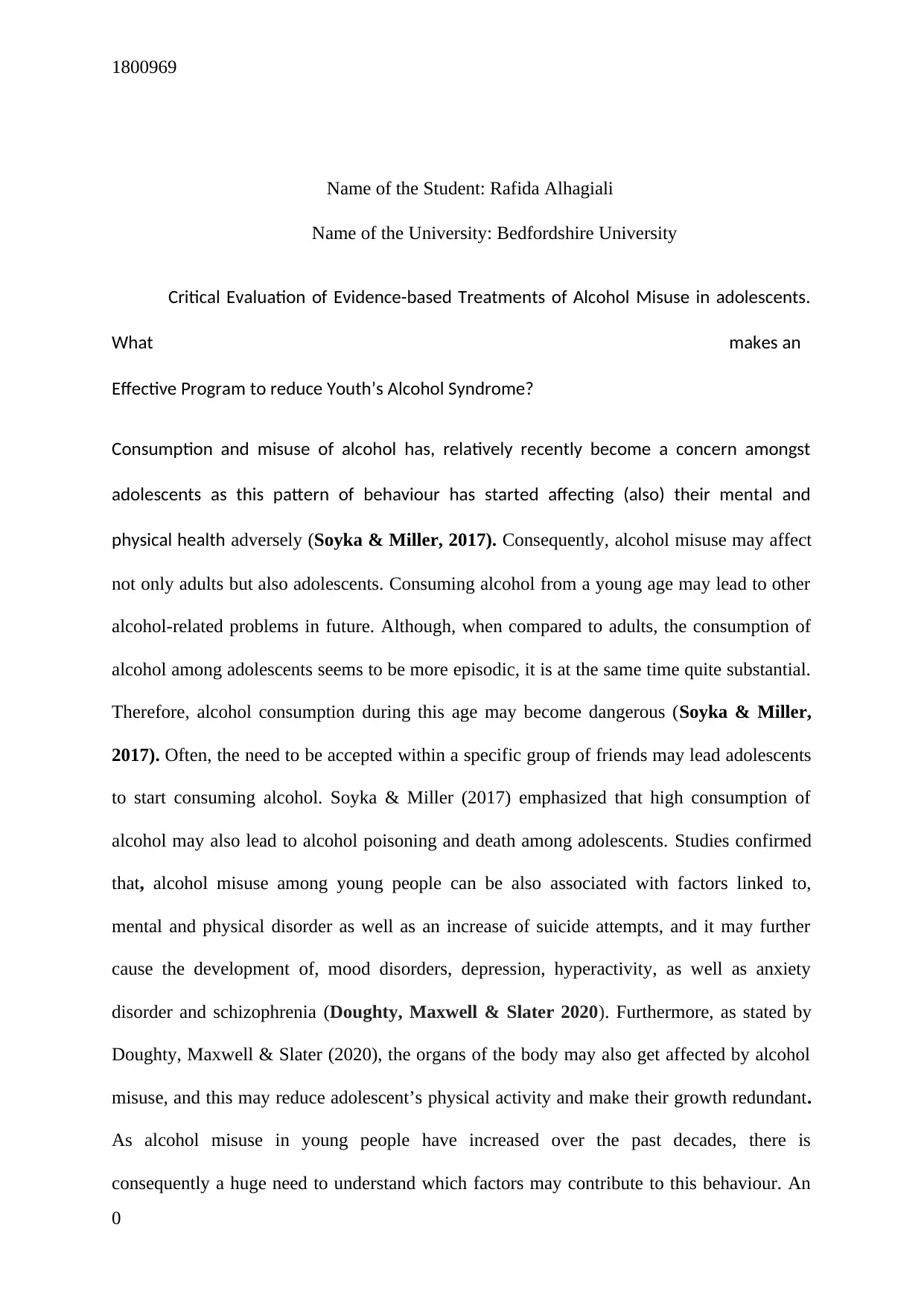
1800969
Name of the Student: Rafida Alhagiali
Name of the University: Bedfordshire University
Critical Evaluation of Evidence-based Treatments of Alcohol Misuse in adolescents.
What makes an
Effective Program to reduce Youth’s Alcohol Syndrome?
Consumption and misuse of alcohol has, relatively recently become a concern amongst
adolescents as this pattern of behaviour has started affecting (also) their mental and
physical health adversely (Soyka & Miller, 2017). Consequently, alcohol misuse may affect
not only adults but also adolescents. Consuming alcohol from a young age may lead to other
alcohol-related problems in future. Although, when compared to adults, the consumption of
alcohol among adolescents seems to be more episodic, it is at the same time quite substantial.
Therefore, alcohol consumption during this age may become dangerous (Soyka & Miller,
2017). Often, the need to be accepted within a specific group of friends may lead adolescents
to start consuming alcohol. Soyka & Miller (2017) emphasized that high consumption of
alcohol may also lead to alcohol poisoning and death among adolescents. Studies confirmed
that, alcohol misuse among young people can be also associated with factors linked to,
mental and physical disorder as well as an increase of suicide attempts, and it may further
cause the development of, mood disorders, depression, hyperactivity, as well as anxiety
disorder and schizophrenia (Doughty, Maxwell & Slater 2020). Furthermore, as stated by
Doughty, Maxwell & Slater (2020), the organs of the body may also get affected by alcohol
misuse, and this may reduce adolescent’s physical activity and make their growth redundant.
As alcohol misuse in young people have increased over the past decades, there is
consequently a huge need to understand which factors may contribute to this behaviour. An
0
Name of the Student: Rafida Alhagiali
Name of the University: Bedfordshire University
Critical Evaluation of Evidence-based Treatments of Alcohol Misuse in adolescents.
What makes an
Effective Program to reduce Youth’s Alcohol Syndrome?
Consumption and misuse of alcohol has, relatively recently become a concern amongst
adolescents as this pattern of behaviour has started affecting (also) their mental and
physical health adversely (Soyka & Miller, 2017). Consequently, alcohol misuse may affect
not only adults but also adolescents. Consuming alcohol from a young age may lead to other
alcohol-related problems in future. Although, when compared to adults, the consumption of
alcohol among adolescents seems to be more episodic, it is at the same time quite substantial.
Therefore, alcohol consumption during this age may become dangerous (Soyka & Miller,
2017). Often, the need to be accepted within a specific group of friends may lead adolescents
to start consuming alcohol. Soyka & Miller (2017) emphasized that high consumption of
alcohol may also lead to alcohol poisoning and death among adolescents. Studies confirmed
that, alcohol misuse among young people can be also associated with factors linked to,
mental and physical disorder as well as an increase of suicide attempts, and it may further
cause the development of, mood disorders, depression, hyperactivity, as well as anxiety
disorder and schizophrenia (Doughty, Maxwell & Slater 2020). Furthermore, as stated by
Doughty, Maxwell & Slater (2020), the organs of the body may also get affected by alcohol
misuse, and this may reduce adolescent’s physical activity and make their growth redundant.
As alcohol misuse in young people have increased over the past decades, there is
consequently a huge need to understand which factors may contribute to this behaviour. An
0
Paraphrase This Document
Need a fresh take? Get an instant paraphrase of this document with our AI Paraphraser
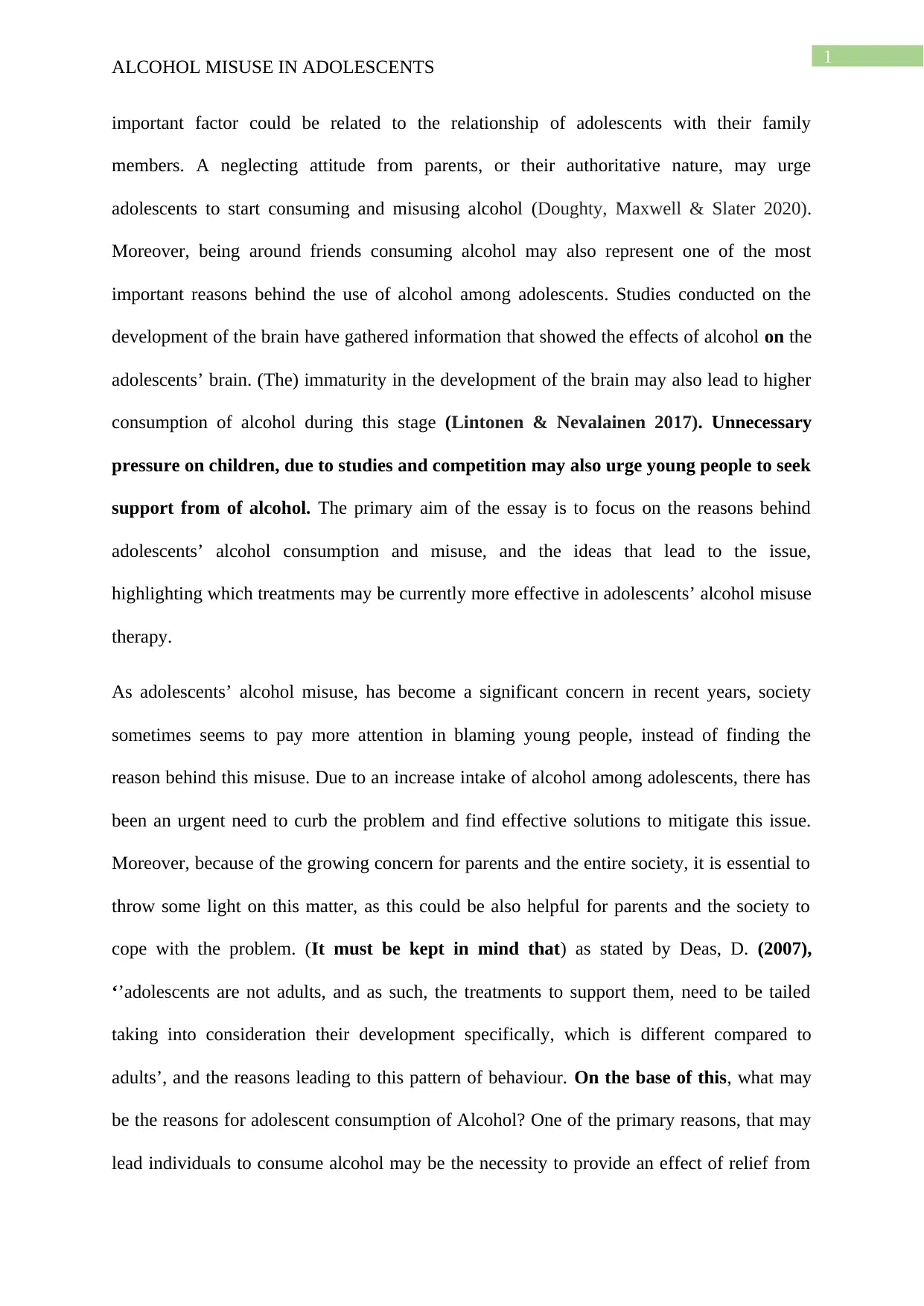
1
ALCOHOL MISUSE IN ADOLESCENTS
important factor could be related to the relationship of adolescents with their family
members. A neglecting attitude from parents, or their authoritative nature, may urge
adolescents to start consuming and misusing alcohol (Doughty, Maxwell & Slater 2020).
Moreover, being around friends consuming alcohol may also represent one of the most
important reasons behind the use of alcohol among adolescents. Studies conducted on the
development of the brain have gathered information that showed the effects of alcohol on the
adolescents’ brain. (The) immaturity in the development of the brain may also lead to higher
consumption of alcohol during this stage (Lintonen & Nevalainen 2017). Unnecessary
pressure on children, due to studies and competition may also urge young people to seek
support from of alcohol. The primary aim of the essay is to focus on the reasons behind
adolescents’ alcohol consumption and misuse, and the ideas that lead to the issue,
highlighting which treatments may be currently more effective in adolescents’ alcohol misuse
therapy.
As adolescents’ alcohol misuse, has become a significant concern in recent years, society
sometimes seems to pay more attention in blaming young people, instead of finding the
reason behind this misuse. Due to an increase intake of alcohol among adolescents, there has
been an urgent need to curb the problem and find effective solutions to mitigate this issue.
Moreover, because of the growing concern for parents and the entire society, it is essential to
throw some light on this matter, as this could be also helpful for parents and the society to
cope with the problem. (It must be kept in mind that) as stated by Deas, D. (2007),
‘’adolescents are not adults, and as such, the treatments to support them, need to be tailed
taking into consideration their development specifically, which is different compared to
adults’, and the reasons leading to this pattern of behaviour. On the base of this, what may
be the reasons for adolescent consumption of Alcohol? One of the primary reasons, that may
lead individuals to consume alcohol may be the necessity to provide an effect of relief from
ALCOHOL MISUSE IN ADOLESCENTS
important factor could be related to the relationship of adolescents with their family
members. A neglecting attitude from parents, or their authoritative nature, may urge
adolescents to start consuming and misusing alcohol (Doughty, Maxwell & Slater 2020).
Moreover, being around friends consuming alcohol may also represent one of the most
important reasons behind the use of alcohol among adolescents. Studies conducted on the
development of the brain have gathered information that showed the effects of alcohol on the
adolescents’ brain. (The) immaturity in the development of the brain may also lead to higher
consumption of alcohol during this stage (Lintonen & Nevalainen 2017). Unnecessary
pressure on children, due to studies and competition may also urge young people to seek
support from of alcohol. The primary aim of the essay is to focus on the reasons behind
adolescents’ alcohol consumption and misuse, and the ideas that lead to the issue,
highlighting which treatments may be currently more effective in adolescents’ alcohol misuse
therapy.
As adolescents’ alcohol misuse, has become a significant concern in recent years, society
sometimes seems to pay more attention in blaming young people, instead of finding the
reason behind this misuse. Due to an increase intake of alcohol among adolescents, there has
been an urgent need to curb the problem and find effective solutions to mitigate this issue.
Moreover, because of the growing concern for parents and the entire society, it is essential to
throw some light on this matter, as this could be also helpful for parents and the society to
cope with the problem. (It must be kept in mind that) as stated by Deas, D. (2007),
‘’adolescents are not adults, and as such, the treatments to support them, need to be tailed
taking into consideration their development specifically, which is different compared to
adults’, and the reasons leading to this pattern of behaviour. On the base of this, what may
be the reasons for adolescent consumption of Alcohol? One of the primary reasons, that may
lead individuals to consume alcohol may be the necessity to provide an effect of relief from
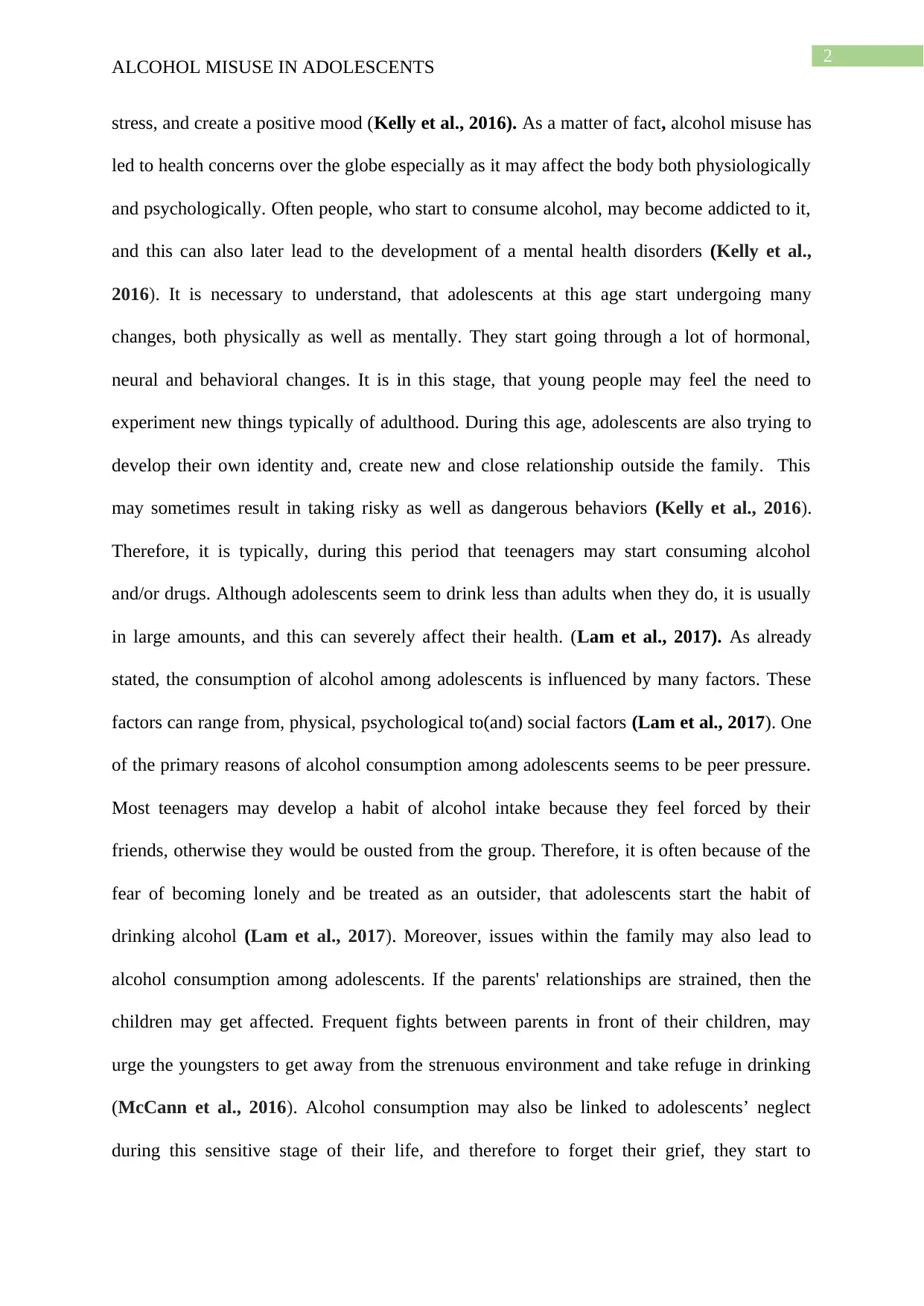
2
ALCOHOL MISUSE IN ADOLESCENTS
stress, and create a positive mood (Kelly et al., 2016). As a matter of fact, alcohol misuse has
led to health concerns over the globe especially as it may affect the body both physiologically
and psychologically. Often people, who start to consume alcohol, may become addicted to it,
and this can also later lead to the development of a mental health disorders (Kelly et al.,
2016). It is necessary to understand, that adolescents at this age start undergoing many
changes, both physically as well as mentally. They start going through a lot of hormonal,
neural and behavioral changes. It is in this stage, that young people may feel the need to
experiment new things typically of adulthood. During this age, adolescents are also trying to
develop their own identity and, create new and close relationship outside the family. This
may sometimes result in taking risky as well as dangerous behaviors (Kelly et al., 2016).
Therefore, it is typically, during this period that teenagers may start consuming alcohol
and/or drugs. Although adolescents seem to drink less than adults when they do, it is usually
in large amounts, and this can severely affect their health. (Lam et al., 2017). As already
stated, the consumption of alcohol among adolescents is influenced by many factors. These
factors can range from, physical, psychological to(and) social factors (Lam et al., 2017). One
of the primary reasons of alcohol consumption among adolescents seems to be peer pressure.
Most teenagers may develop a habit of alcohol intake because they feel forced by their
friends, otherwise they would be ousted from the group. Therefore, it is often because of the
fear of becoming lonely and be treated as an outsider, that adolescents start the habit of
drinking alcohol (Lam et al., 2017). Moreover, issues within the family may also lead to
alcohol consumption among adolescents. If the parents' relationships are strained, then the
children may get affected. Frequent fights between parents in front of their children, may
urge the youngsters to get away from the strenuous environment and take refuge in drinking
(McCann et al., 2016). Alcohol consumption may also be linked to adolescents’ neglect
during this sensitive stage of their life, and therefore to forget their grief, they start to
ALCOHOL MISUSE IN ADOLESCENTS
stress, and create a positive mood (Kelly et al., 2016). As a matter of fact, alcohol misuse has
led to health concerns over the globe especially as it may affect the body both physiologically
and psychologically. Often people, who start to consume alcohol, may become addicted to it,
and this can also later lead to the development of a mental health disorders (Kelly et al.,
2016). It is necessary to understand, that adolescents at this age start undergoing many
changes, both physically as well as mentally. They start going through a lot of hormonal,
neural and behavioral changes. It is in this stage, that young people may feel the need to
experiment new things typically of adulthood. During this age, adolescents are also trying to
develop their own identity and, create new and close relationship outside the family. This
may sometimes result in taking risky as well as dangerous behaviors (Kelly et al., 2016).
Therefore, it is typically, during this period that teenagers may start consuming alcohol
and/or drugs. Although adolescents seem to drink less than adults when they do, it is usually
in large amounts, and this can severely affect their health. (Lam et al., 2017). As already
stated, the consumption of alcohol among adolescents is influenced by many factors. These
factors can range from, physical, psychological to(and) social factors (Lam et al., 2017). One
of the primary reasons of alcohol consumption among adolescents seems to be peer pressure.
Most teenagers may develop a habit of alcohol intake because they feel forced by their
friends, otherwise they would be ousted from the group. Therefore, it is often because of the
fear of becoming lonely and be treated as an outsider, that adolescents start the habit of
drinking alcohol (Lam et al., 2017). Moreover, issues within the family may also lead to
alcohol consumption among adolescents. If the parents' relationships are strained, then the
children may get affected. Frequent fights between parents in front of their children, may
urge the youngsters to get away from the strenuous environment and take refuge in drinking
(McCann et al., 2016). Alcohol consumption may also be linked to adolescents’ neglect
during this sensitive stage of their life, and therefore to forget their grief, they start to
⊘ This is a preview!⊘
Do you want full access?
Subscribe today to unlock all pages.

Trusted by 1+ million students worldwide
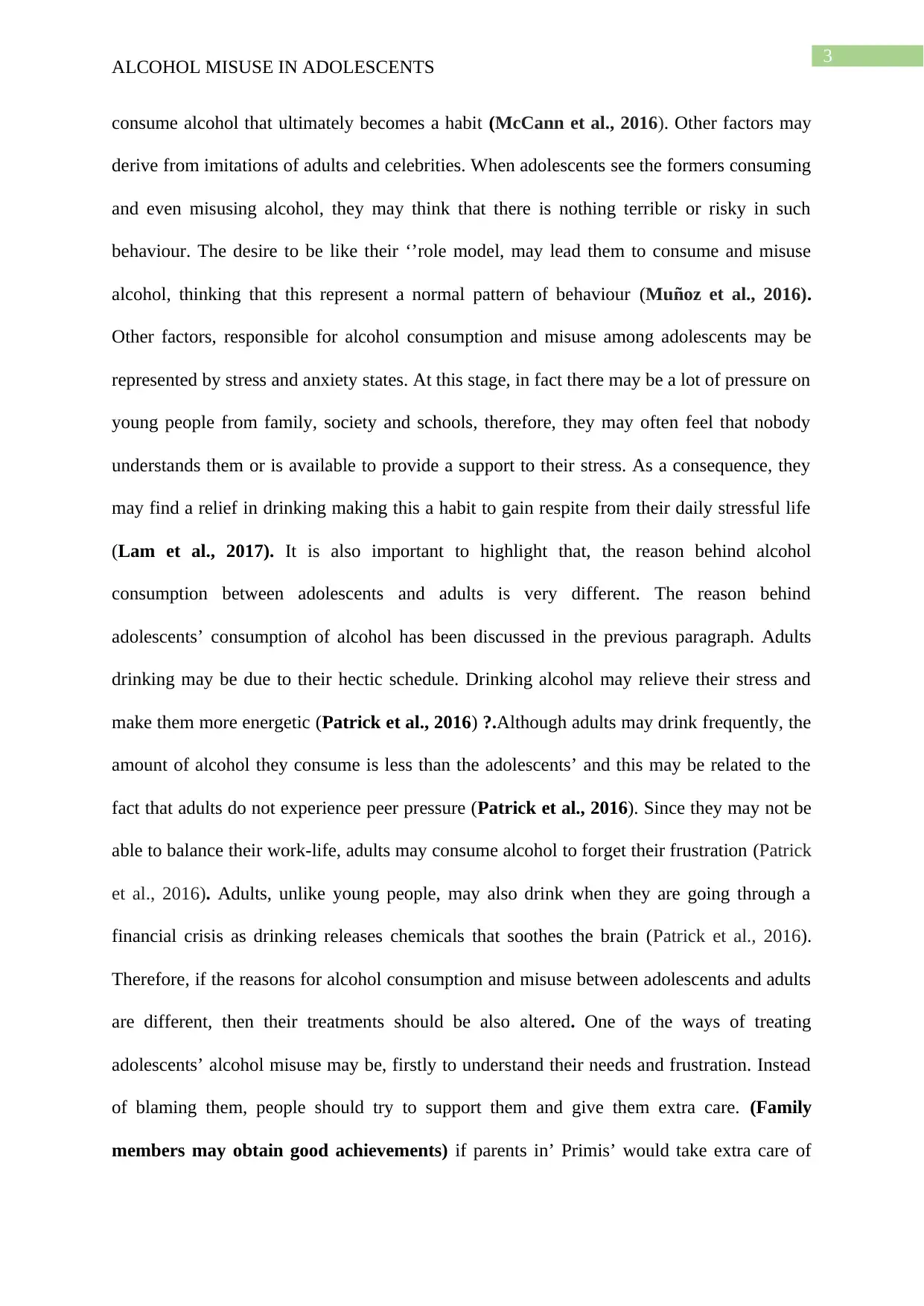
3
ALCOHOL MISUSE IN ADOLESCENTS
consume alcohol that ultimately becomes a habit (McCann et al., 2016). Other factors may
derive from imitations of adults and celebrities. When adolescents see the formers consuming
and even misusing alcohol, they may think that there is nothing terrible or risky in such
behaviour. The desire to be like their ‘’role model, may lead them to consume and misuse
alcohol, thinking that this represent a normal pattern of behaviour (Muñoz et al., 2016).
Other factors, responsible for alcohol consumption and misuse among adolescents may be
represented by stress and anxiety states. At this stage, in fact there may be a lot of pressure on
young people from family, society and schools, therefore, they may often feel that nobody
understands them or is available to provide a support to their stress. As a consequence, they
may find a relief in drinking making this a habit to gain respite from their daily stressful life
(Lam et al., 2017). It is also important to highlight that, the reason behind alcohol
consumption between adolescents and adults is very different. The reason behind
adolescents’ consumption of alcohol has been discussed in the previous paragraph. Adults
drinking may be due to their hectic schedule. Drinking alcohol may relieve their stress and
make them more energetic (Patrick et al., 2016) ?.Although adults may drink frequently, the
amount of alcohol they consume is less than the adolescents’ and this may be related to the
fact that adults do not experience peer pressure (Patrick et al., 2016). Since they may not be
able to balance their work-life, adults may consume alcohol to forget their frustration (Patrick
et al., 2016). Adults, unlike young people, may also drink when they are going through a
financial crisis as drinking releases chemicals that soothes the brain (Patrick et al., 2016).
Therefore, if the reasons for alcohol consumption and misuse between adolescents and adults
are different, then their treatments should be also altered. One of the ways of treating
adolescents’ alcohol misuse may be, firstly to understand their needs and frustration. Instead
of blaming them, people should try to support them and give them extra care. (Family
members may obtain good achievements) if parents in’ Primis’ would take extra care of
ALCOHOL MISUSE IN ADOLESCENTS
consume alcohol that ultimately becomes a habit (McCann et al., 2016). Other factors may
derive from imitations of adults and celebrities. When adolescents see the formers consuming
and even misusing alcohol, they may think that there is nothing terrible or risky in such
behaviour. The desire to be like their ‘’role model, may lead them to consume and misuse
alcohol, thinking that this represent a normal pattern of behaviour (Muñoz et al., 2016).
Other factors, responsible for alcohol consumption and misuse among adolescents may be
represented by stress and anxiety states. At this stage, in fact there may be a lot of pressure on
young people from family, society and schools, therefore, they may often feel that nobody
understands them or is available to provide a support to their stress. As a consequence, they
may find a relief in drinking making this a habit to gain respite from their daily stressful life
(Lam et al., 2017). It is also important to highlight that, the reason behind alcohol
consumption between adolescents and adults is very different. The reason behind
adolescents’ consumption of alcohol has been discussed in the previous paragraph. Adults
drinking may be due to their hectic schedule. Drinking alcohol may relieve their stress and
make them more energetic (Patrick et al., 2016) ?.Although adults may drink frequently, the
amount of alcohol they consume is less than the adolescents’ and this may be related to the
fact that adults do not experience peer pressure (Patrick et al., 2016). Since they may not be
able to balance their work-life, adults may consume alcohol to forget their frustration (Patrick
et al., 2016). Adults, unlike young people, may also drink when they are going through a
financial crisis as drinking releases chemicals that soothes the brain (Patrick et al., 2016).
Therefore, if the reasons for alcohol consumption and misuse between adolescents and adults
are different, then their treatments should be also altered. One of the ways of treating
adolescents’ alcohol misuse may be, firstly to understand their needs and frustration. Instead
of blaming them, people should try to support them and give them extra care. (Family
members may obtain good achievements) if parents in’ Primis’ would take extra care of
Paraphrase This Document
Need a fresh take? Get an instant paraphrase of this document with our AI Paraphraser
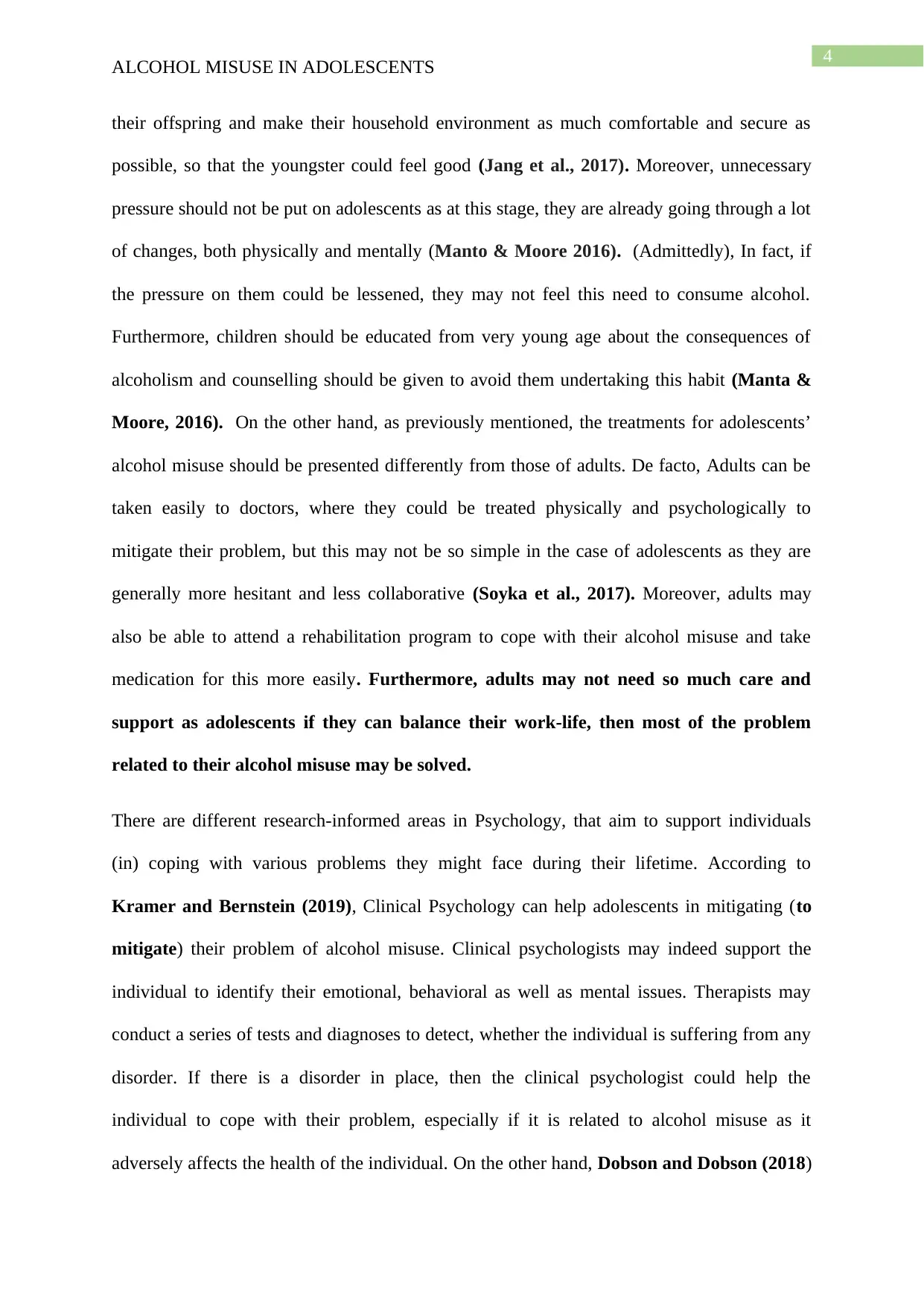
4
ALCOHOL MISUSE IN ADOLESCENTS
their offspring and make their household environment as much comfortable and secure as
possible, so that the youngster could feel good (Jang et al., 2017). Moreover, unnecessary
pressure should not be put on adolescents as at this stage, they are already going through a lot
of changes, both physically and mentally (Manto & Moore 2016). (Admittedly), In fact, if
the pressure on them could be lessened, they may not feel this need to consume alcohol.
Furthermore, children should be educated from very young age about the consequences of
alcoholism and counselling should be given to avoid them undertaking this habit (Manta &
Moore, 2016). On the other hand, as previously mentioned, the treatments for adolescents’
alcohol misuse should be presented differently from those of adults. De facto, Adults can be
taken easily to doctors, where they could be treated physically and psychologically to
mitigate their problem, but this may not be so simple in the case of adolescents as they are
generally more hesitant and less collaborative (Soyka et al., 2017). Moreover, adults may
also be able to attend a rehabilitation program to cope with their alcohol misuse and take
medication for this more easily. Furthermore, adults may not need so much care and
support as adolescents if they can balance their work-life, then most of the problem
related to their alcohol misuse may be solved.
There are different research-informed areas in Psychology, that aim to support individuals
(in) coping with various problems they might face during their lifetime. According to
Kramer and Bernstein (2019), Clinical Psychology can help adolescents in mitigating (to
mitigate) their problem of alcohol misuse. Clinical psychologists may indeed support the
individual to identify their emotional, behavioral as well as mental issues. Therapists may
conduct a series of tests and diagnoses to detect, whether the individual is suffering from any
disorder. If there is a disorder in place, then the clinical psychologist could help the
individual to cope with their problem, especially if it is related to alcohol misuse as it
adversely affects the health of the individual. On the other hand, Dobson and Dobson (2018)
ALCOHOL MISUSE IN ADOLESCENTS
their offspring and make their household environment as much comfortable and secure as
possible, so that the youngster could feel good (Jang et al., 2017). Moreover, unnecessary
pressure should not be put on adolescents as at this stage, they are already going through a lot
of changes, both physically and mentally (Manto & Moore 2016). (Admittedly), In fact, if
the pressure on them could be lessened, they may not feel this need to consume alcohol.
Furthermore, children should be educated from very young age about the consequences of
alcoholism and counselling should be given to avoid them undertaking this habit (Manta &
Moore, 2016). On the other hand, as previously mentioned, the treatments for adolescents’
alcohol misuse should be presented differently from those of adults. De facto, Adults can be
taken easily to doctors, where they could be treated physically and psychologically to
mitigate their problem, but this may not be so simple in the case of adolescents as they are
generally more hesitant and less collaborative (Soyka et al., 2017). Moreover, adults may
also be able to attend a rehabilitation program to cope with their alcohol misuse and take
medication for this more easily. Furthermore, adults may not need so much care and
support as adolescents if they can balance their work-life, then most of the problem
related to their alcohol misuse may be solved.
There are different research-informed areas in Psychology, that aim to support individuals
(in) coping with various problems they might face during their lifetime. According to
Kramer and Bernstein (2019), Clinical Psychology can help adolescents in mitigating (to
mitigate) their problem of alcohol misuse. Clinical psychologists may indeed support the
individual to identify their emotional, behavioral as well as mental issues. Therapists may
conduct a series of tests and diagnoses to detect, whether the individual is suffering from any
disorder. If there is a disorder in place, then the clinical psychologist could help the
individual to cope with their problem, especially if it is related to alcohol misuse as it
adversely affects the health of the individual. On the other hand, Dobson and Dobson (2018)
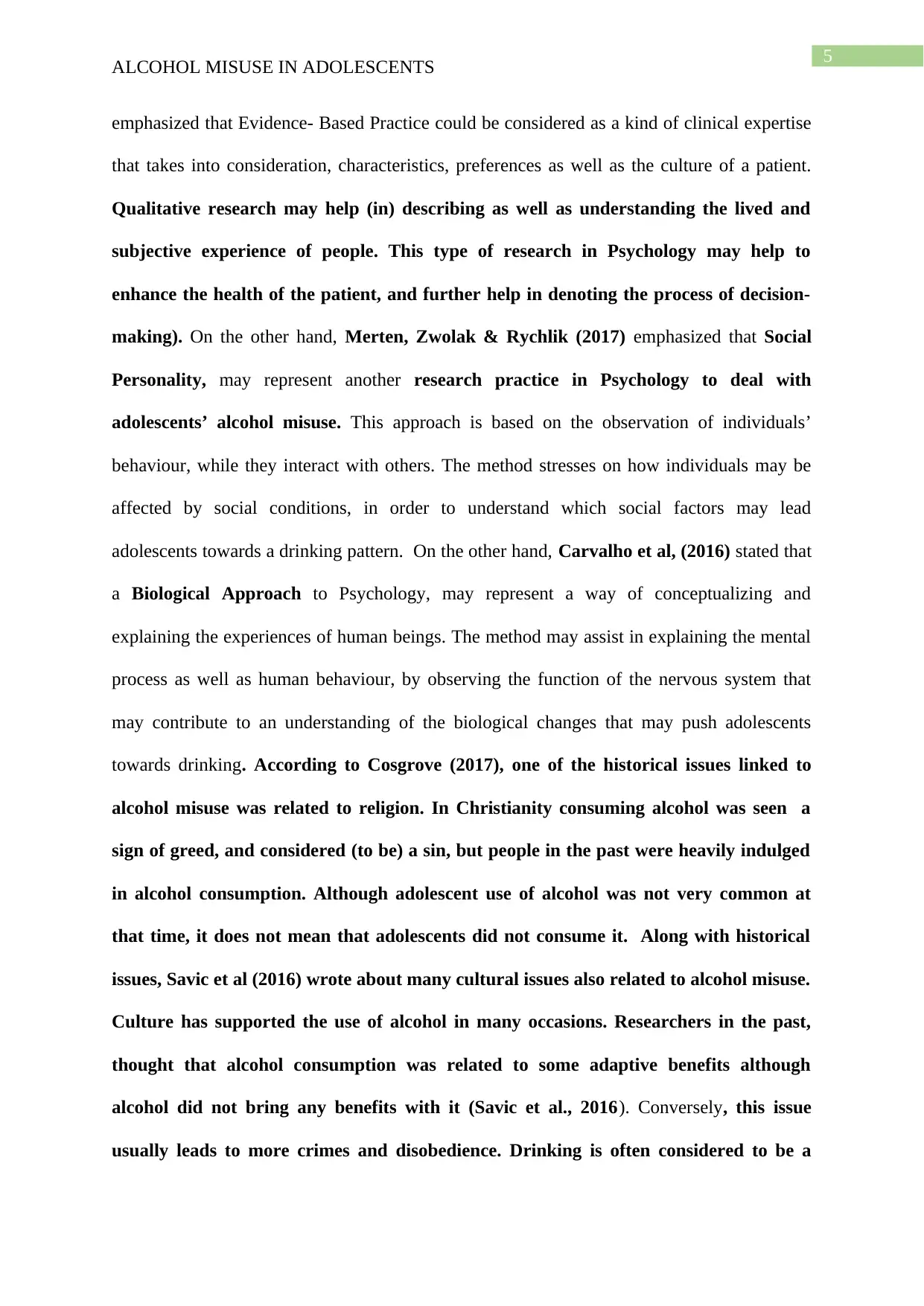
5
ALCOHOL MISUSE IN ADOLESCENTS
emphasized that Evidence- Based Practice could be considered as a kind of clinical expertise
that takes into consideration, characteristics, preferences as well as the culture of a patient.
Qualitative research may help (in) describing as well as understanding the lived and
subjective experience of people. This type of research in Psychology may help to
enhance the health of the patient, and further help in denoting the process of decision-
making). On the other hand, Merten, Zwolak & Rychlik (2017) emphasized that Social
Personality, may represent another research practice in Psychology to deal with
adolescents’ alcohol misuse. This approach is based on the observation of individuals’
behaviour, while they interact with others. The method stresses on how individuals may be
affected by social conditions, in order to understand which social factors may lead
adolescents towards a drinking pattern. On the other hand, Carvalho et al, (2016) stated that
a Biological Approach to Psychology, may represent a way of conceptualizing and
explaining the experiences of human beings. The method may assist in explaining the mental
process as well as human behaviour, by observing the function of the nervous system that
may contribute to an understanding of the biological changes that may push adolescents
towards drinking. According to Cosgrove (2017), one of the historical issues linked to
alcohol misuse was related to religion. In Christianity consuming alcohol was seen a
sign of greed, and considered (to be) a sin, but people in the past were heavily indulged
in alcohol consumption. Although adolescent use of alcohol was not very common at
that time, it does not mean that adolescents did not consume it. Along with historical
issues, Savic et al (2016) wrote about many cultural issues also related to alcohol misuse.
Culture has supported the use of alcohol in many occasions. Researchers in the past,
thought that alcohol consumption was related to some adaptive benefits although
alcohol did not bring any benefits with it (Savic et al., 2016). Conversely, this issue
usually leads to more crimes and disobedience. Drinking is often considered to be a
ALCOHOL MISUSE IN ADOLESCENTS
emphasized that Evidence- Based Practice could be considered as a kind of clinical expertise
that takes into consideration, characteristics, preferences as well as the culture of a patient.
Qualitative research may help (in) describing as well as understanding the lived and
subjective experience of people. This type of research in Psychology may help to
enhance the health of the patient, and further help in denoting the process of decision-
making). On the other hand, Merten, Zwolak & Rychlik (2017) emphasized that Social
Personality, may represent another research practice in Psychology to deal with
adolescents’ alcohol misuse. This approach is based on the observation of individuals’
behaviour, while they interact with others. The method stresses on how individuals may be
affected by social conditions, in order to understand which social factors may lead
adolescents towards a drinking pattern. On the other hand, Carvalho et al, (2016) stated that
a Biological Approach to Psychology, may represent a way of conceptualizing and
explaining the experiences of human beings. The method may assist in explaining the mental
process as well as human behaviour, by observing the function of the nervous system that
may contribute to an understanding of the biological changes that may push adolescents
towards drinking. According to Cosgrove (2017), one of the historical issues linked to
alcohol misuse was related to religion. In Christianity consuming alcohol was seen a
sign of greed, and considered (to be) a sin, but people in the past were heavily indulged
in alcohol consumption. Although adolescent use of alcohol was not very common at
that time, it does not mean that adolescents did not consume it. Along with historical
issues, Savic et al (2016) wrote about many cultural issues also related to alcohol misuse.
Culture has supported the use of alcohol in many occasions. Researchers in the past,
thought that alcohol consumption was related to some adaptive benefits although
alcohol did not bring any benefits with it (Savic et al., 2016). Conversely, this issue
usually leads to more crimes and disobedience. Drinking is often considered to be a
⊘ This is a preview!⊘
Do you want full access?
Subscribe today to unlock all pages.

Trusted by 1+ million students worldwide
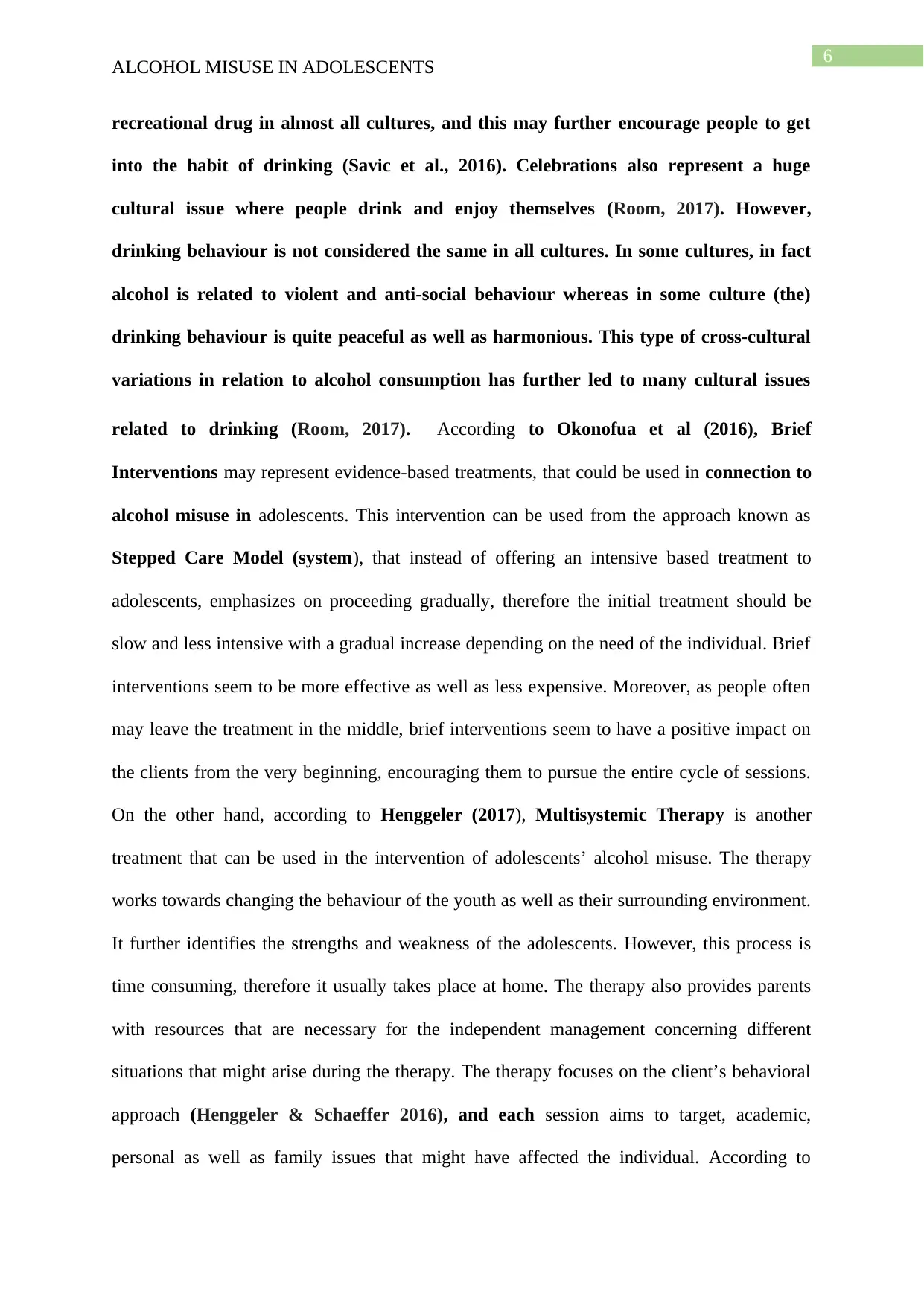
6
ALCOHOL MISUSE IN ADOLESCENTS
recreational drug in almost all cultures, and this may further encourage people to get
into the habit of drinking (Savic et al., 2016). Celebrations also represent a huge
cultural issue where people drink and enjoy themselves (Room, 2017). However,
drinking behaviour is not considered the same in all cultures. In some cultures, in fact
alcohol is related to violent and anti-social behaviour whereas in some culture (the)
drinking behaviour is quite peaceful as well as harmonious. This type of cross-cultural
variations in relation to alcohol consumption has further led to many cultural issues
related to drinking (Room, 2017). According to Okonofua et al (2016), Brief
Interventions may represent evidence-based treatments, that could be used in connection to
alcohol misuse in adolescents. This intervention can be used from the approach known as
Stepped Care Model (system), that instead of offering an intensive based treatment to
adolescents, emphasizes on proceeding gradually, therefore the initial treatment should be
slow and less intensive with a gradual increase depending on the need of the individual. Brief
interventions seem to be more effective as well as less expensive. Moreover, as people often
may leave the treatment in the middle, brief interventions seem to have a positive impact on
the clients from the very beginning, encouraging them to pursue the entire cycle of sessions.
On the other hand, according to Henggeler (2017), Multisystemic Therapy is another
treatment that can be used in the intervention of adolescents’ alcohol misuse. The therapy
works towards changing the behaviour of the youth as well as their surrounding environment.
It further identifies the strengths and weakness of the adolescents. However, this process is
time consuming, therefore it usually takes place at home. The therapy also provides parents
with resources that are necessary for the independent management concerning different
situations that might arise during the therapy. The therapy focuses on the client’s behavioral
approach (Henggeler & Schaeffer 2016), and each session aims to target, academic,
personal as well as family issues that might have affected the individual. According to
ALCOHOL MISUSE IN ADOLESCENTS
recreational drug in almost all cultures, and this may further encourage people to get
into the habit of drinking (Savic et al., 2016). Celebrations also represent a huge
cultural issue where people drink and enjoy themselves (Room, 2017). However,
drinking behaviour is not considered the same in all cultures. In some cultures, in fact
alcohol is related to violent and anti-social behaviour whereas in some culture (the)
drinking behaviour is quite peaceful as well as harmonious. This type of cross-cultural
variations in relation to alcohol consumption has further led to many cultural issues
related to drinking (Room, 2017). According to Okonofua et al (2016), Brief
Interventions may represent evidence-based treatments, that could be used in connection to
alcohol misuse in adolescents. This intervention can be used from the approach known as
Stepped Care Model (system), that instead of offering an intensive based treatment to
adolescents, emphasizes on proceeding gradually, therefore the initial treatment should be
slow and less intensive with a gradual increase depending on the need of the individual. Brief
interventions seem to be more effective as well as less expensive. Moreover, as people often
may leave the treatment in the middle, brief interventions seem to have a positive impact on
the clients from the very beginning, encouraging them to pursue the entire cycle of sessions.
On the other hand, according to Henggeler (2017), Multisystemic Therapy is another
treatment that can be used in the intervention of adolescents’ alcohol misuse. The therapy
works towards changing the behaviour of the youth as well as their surrounding environment.
It further identifies the strengths and weakness of the adolescents. However, this process is
time consuming, therefore it usually takes place at home. The therapy also provides parents
with resources that are necessary for the independent management concerning different
situations that might arise during the therapy. The therapy focuses on the client’s behavioral
approach (Henggeler & Schaeffer 2016), and each session aims to target, academic,
personal as well as family issues that might have affected the individual. According to
Paraphrase This Document
Need a fresh take? Get an instant paraphrase of this document with our AI Paraphraser
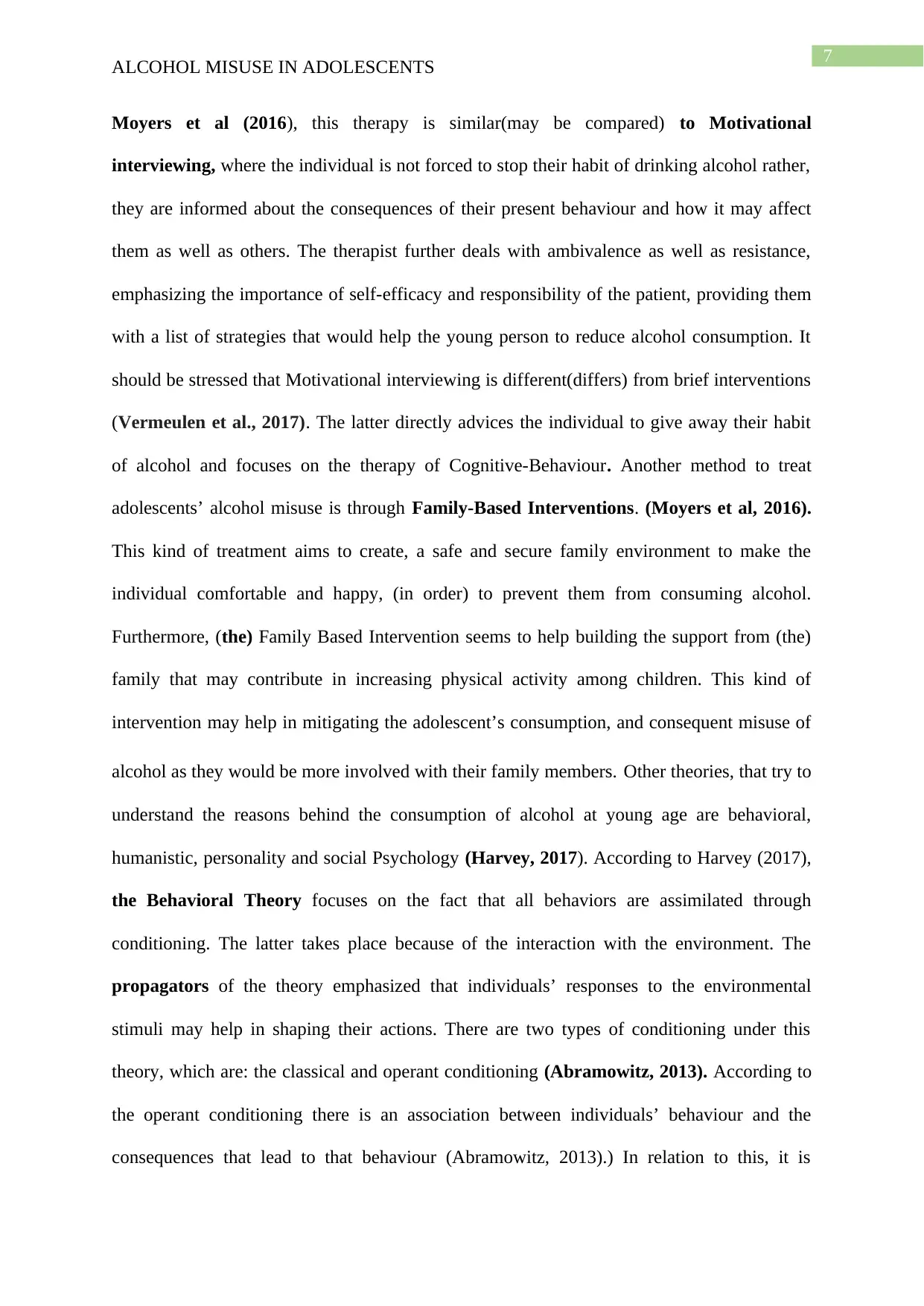
7
ALCOHOL MISUSE IN ADOLESCENTS
Moyers et al (2016), this therapy is similar(may be compared) to Motivational
interviewing, where the individual is not forced to stop their habit of drinking alcohol rather,
they are informed about the consequences of their present behaviour and how it may affect
them as well as others. The therapist further deals with ambivalence as well as resistance,
emphasizing the importance of self-efficacy and responsibility of the patient, providing them
with a list of strategies that would help the young person to reduce alcohol consumption. It
should be stressed that Motivational interviewing is different(differs) from brief interventions
(Vermeulen et al., 2017). The latter directly advices the individual to give away their habit
of alcohol and focuses on the therapy of Cognitive-Behaviour. Another method to treat
adolescents’ alcohol misuse is through Family-Based Interventions. (Moyers et al, 2016).
This kind of treatment aims to create, a safe and secure family environment to make the
individual comfortable and happy, (in order) to prevent them from consuming alcohol.
Furthermore, (the) Family Based Intervention seems to help building the support from (the)
family that may contribute in increasing physical activity among children. This kind of
intervention may help in mitigating the adolescent’s consumption, and consequent misuse of
alcohol as they would be more involved with their family members. Other theories, that try to
understand the reasons behind the consumption of alcohol at young age are behavioral,
humanistic, personality and social Psychology (Harvey, 2017). According to Harvey (2017),
the Behavioral Theory focuses on the fact that all behaviors are assimilated through
conditioning. The latter takes place because of the interaction with the environment. The
propagators of the theory emphasized that individuals’ responses to the environmental
stimuli may help in shaping their actions. There are two types of conditioning under this
theory, which are: the classical and operant conditioning (Abramowitz, 2013). According to
the operant conditioning there is an association between individuals’ behaviour and the
consequences that lead to that behaviour (Abramowitz, 2013).) In relation to this, it is
ALCOHOL MISUSE IN ADOLESCENTS
Moyers et al (2016), this therapy is similar(may be compared) to Motivational
interviewing, where the individual is not forced to stop their habit of drinking alcohol rather,
they are informed about the consequences of their present behaviour and how it may affect
them as well as others. The therapist further deals with ambivalence as well as resistance,
emphasizing the importance of self-efficacy and responsibility of the patient, providing them
with a list of strategies that would help the young person to reduce alcohol consumption. It
should be stressed that Motivational interviewing is different(differs) from brief interventions
(Vermeulen et al., 2017). The latter directly advices the individual to give away their habit
of alcohol and focuses on the therapy of Cognitive-Behaviour. Another method to treat
adolescents’ alcohol misuse is through Family-Based Interventions. (Moyers et al, 2016).
This kind of treatment aims to create, a safe and secure family environment to make the
individual comfortable and happy, (in order) to prevent them from consuming alcohol.
Furthermore, (the) Family Based Intervention seems to help building the support from (the)
family that may contribute in increasing physical activity among children. This kind of
intervention may help in mitigating the adolescent’s consumption, and consequent misuse of
alcohol as they would be more involved with their family members. Other theories, that try to
understand the reasons behind the consumption of alcohol at young age are behavioral,
humanistic, personality and social Psychology (Harvey, 2017). According to Harvey (2017),
the Behavioral Theory focuses on the fact that all behaviors are assimilated through
conditioning. The latter takes place because of the interaction with the environment. The
propagators of the theory emphasized that individuals’ responses to the environmental
stimuli may help in shaping their actions. There are two types of conditioning under this
theory, which are: the classical and operant conditioning (Abramowitz, 2013). According to
the operant conditioning there is an association between individuals’ behaviour and the
consequences that lead to that behaviour (Abramowitz, 2013).) In relation to this, it is
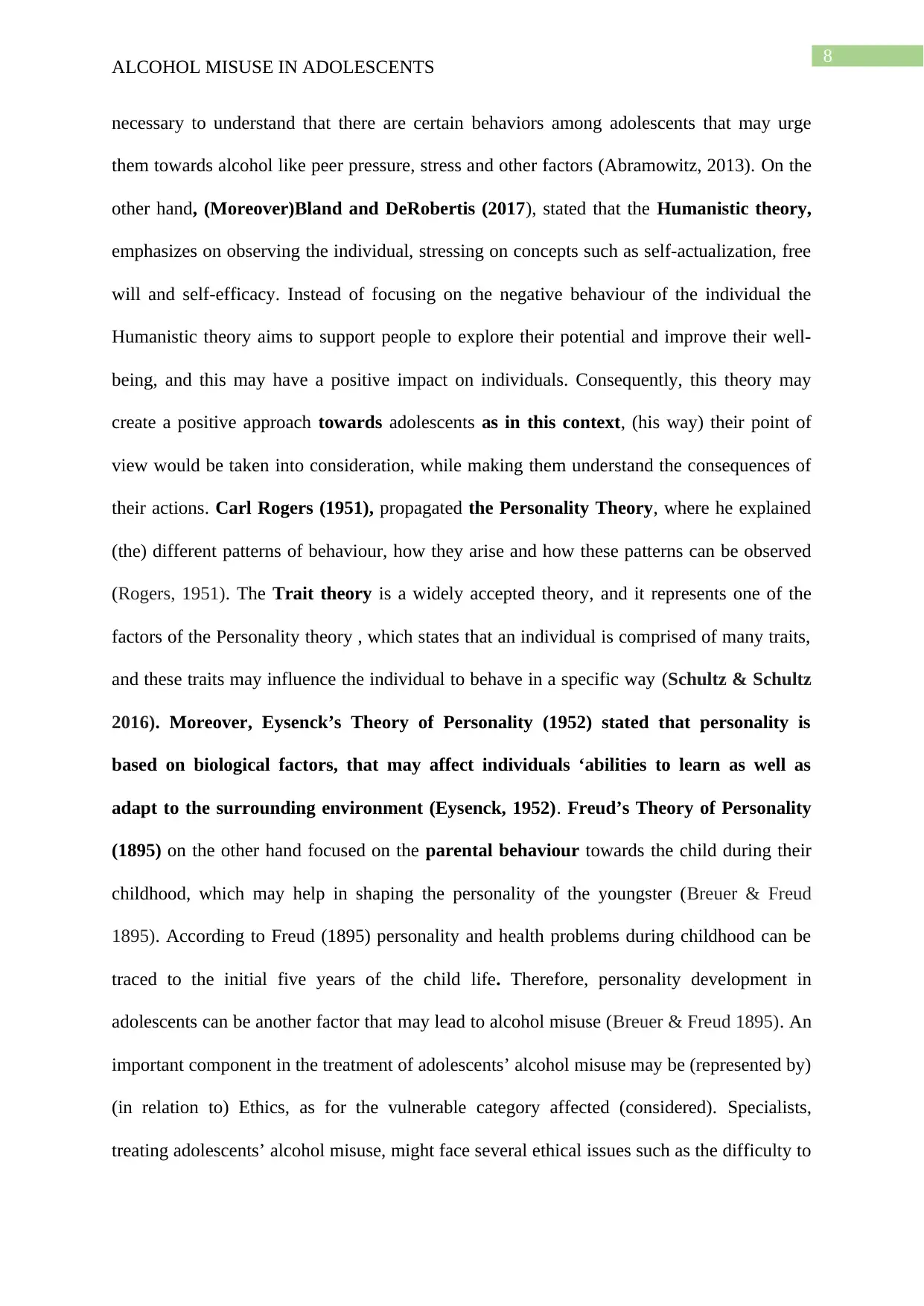
8
ALCOHOL MISUSE IN ADOLESCENTS
necessary to understand that there are certain behaviors among adolescents that may urge
them towards alcohol like peer pressure, stress and other factors (Abramowitz, 2013). On the
other hand, (Moreover)Bland and DeRobertis (2017), stated that the Humanistic theory,
emphasizes on observing the individual, stressing on concepts such as self-actualization, free
will and self-efficacy. Instead of focusing on the negative behaviour of the individual the
Humanistic theory aims to support people to explore their potential and improve their well-
being, and this may have a positive impact on individuals. Consequently, this theory may
create a positive approach towards adolescents as in this context, (his way) their point of
view would be taken into consideration, while making them understand the consequences of
their actions. Carl Rogers (1951), propagated the Personality Theory, where he explained
(the) different patterns of behaviour, how they arise and how these patterns can be observed
(Rogers, 1951). The Trait theory is a widely accepted theory, and it represents one of the
factors of the Personality theory , which states that an individual is comprised of many traits,
and these traits may influence the individual to behave in a specific way (Schultz & Schultz
2016). Moreover, Eysenck’s Theory of Personality (1952) stated that personality is
based on biological factors, that may affect individuals ‘abilities to learn as well as
adapt to the surrounding environment (Eysenck, 1952). Freud’s Theory of Personality
(1895) on the other hand focused on the parental behaviour towards the child during their
childhood, which may help in shaping the personality of the youngster (Breuer & Freud
1895). According to Freud (1895) personality and health problems during childhood can be
traced to the initial five years of the child life. Therefore, personality development in
adolescents can be another factor that may lead to alcohol misuse (Breuer & Freud 1895). An
important component in the treatment of adolescents’ alcohol misuse may be (represented by)
(in relation to) Ethics, as for the vulnerable category affected (considered). Specialists,
treating adolescents’ alcohol misuse, might face several ethical issues such as the difficulty to
ALCOHOL MISUSE IN ADOLESCENTS
necessary to understand that there are certain behaviors among adolescents that may urge
them towards alcohol like peer pressure, stress and other factors (Abramowitz, 2013). On the
other hand, (Moreover)Bland and DeRobertis (2017), stated that the Humanistic theory,
emphasizes on observing the individual, stressing on concepts such as self-actualization, free
will and self-efficacy. Instead of focusing on the negative behaviour of the individual the
Humanistic theory aims to support people to explore their potential and improve their well-
being, and this may have a positive impact on individuals. Consequently, this theory may
create a positive approach towards adolescents as in this context, (his way) their point of
view would be taken into consideration, while making them understand the consequences of
their actions. Carl Rogers (1951), propagated the Personality Theory, where he explained
(the) different patterns of behaviour, how they arise and how these patterns can be observed
(Rogers, 1951). The Trait theory is a widely accepted theory, and it represents one of the
factors of the Personality theory , which states that an individual is comprised of many traits,
and these traits may influence the individual to behave in a specific way (Schultz & Schultz
2016). Moreover, Eysenck’s Theory of Personality (1952) stated that personality is
based on biological factors, that may affect individuals ‘abilities to learn as well as
adapt to the surrounding environment (Eysenck, 1952). Freud’s Theory of Personality
(1895) on the other hand focused on the parental behaviour towards the child during their
childhood, which may help in shaping the personality of the youngster (Breuer & Freud
1895). According to Freud (1895) personality and health problems during childhood can be
traced to the initial five years of the child life. Therefore, personality development in
adolescents can be another factor that may lead to alcohol misuse (Breuer & Freud 1895). An
important component in the treatment of adolescents’ alcohol misuse may be (represented by)
(in relation to) Ethics, as for the vulnerable category affected (considered). Specialists,
treating adolescents’ alcohol misuse, might face several ethical issues such as the difficulty to
⊘ This is a preview!⊘
Do you want full access?
Subscribe today to unlock all pages.

Trusted by 1+ million students worldwide
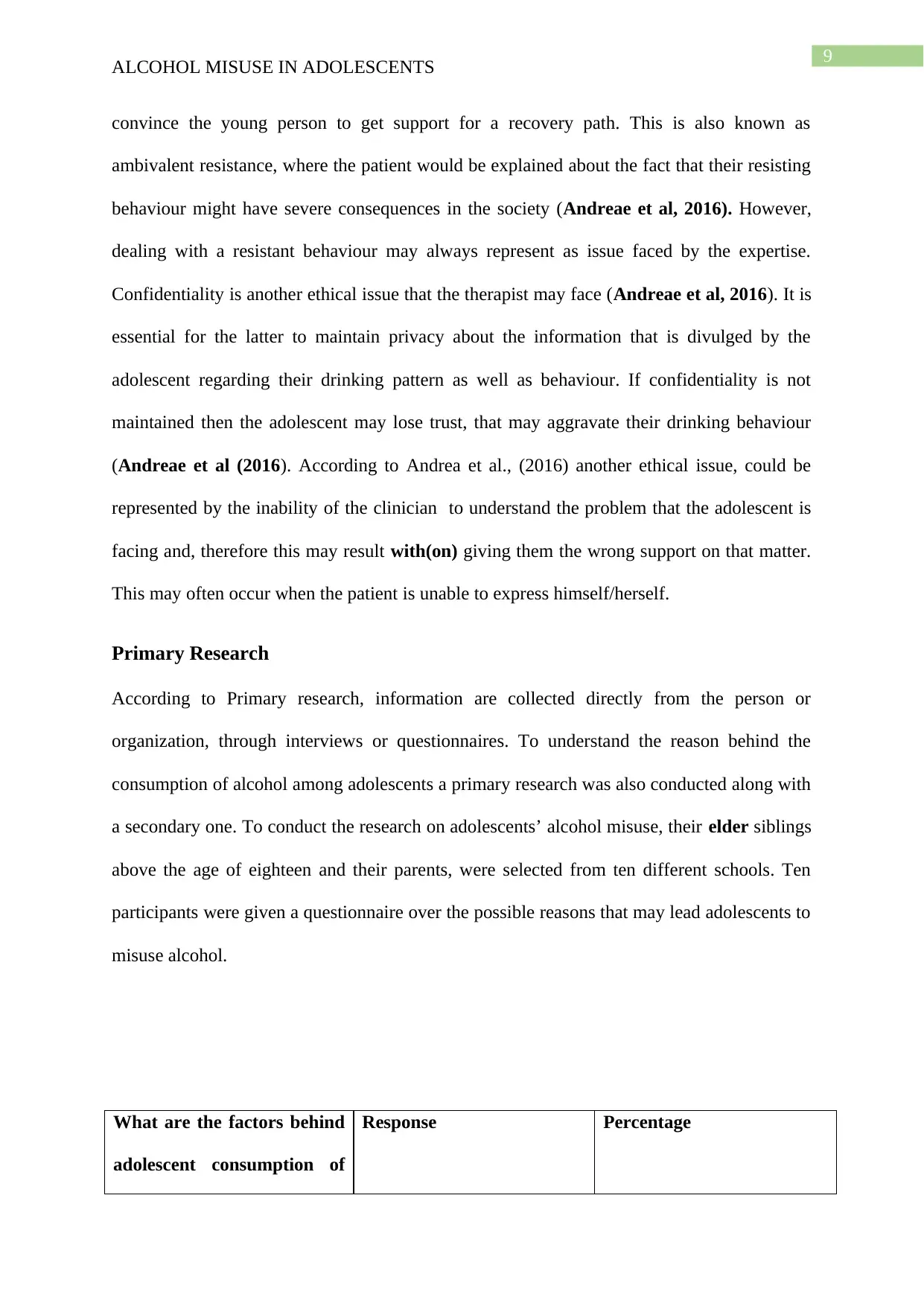
9
ALCOHOL MISUSE IN ADOLESCENTS
convince the young person to get support for a recovery path. This is also known as
ambivalent resistance, where the patient would be explained about the fact that their resisting
behaviour might have severe consequences in the society (Andreae et al, 2016). However,
dealing with a resistant behaviour may always represent as issue faced by the expertise.
Confidentiality is another ethical issue that the therapist may face (Andreae et al, 2016). It is
essential for the latter to maintain privacy about the information that is divulged by the
adolescent regarding their drinking pattern as well as behaviour. If confidentiality is not
maintained then the adolescent may lose trust, that may aggravate their drinking behaviour
(Andreae et al (2016). According to Andrea et al., (2016) another ethical issue, could be
represented by the inability of the clinician to understand the problem that the adolescent is
facing and, therefore this may result with(on) giving them the wrong support on that matter.
This may often occur when the patient is unable to express himself/herself.
Primary Research
According to Primary research, information are collected directly from the person or
organization, through interviews or questionnaires. To understand the reason behind the
consumption of alcohol among adolescents a primary research was also conducted along with
a secondary one. To conduct the research on adolescents’ alcohol misuse, their elder siblings
above the age of eighteen and their parents, were selected from ten different schools. Ten
participants were given a questionnaire over the possible reasons that may lead adolescents to
misuse alcohol.
What are the factors behind
adolescent consumption of
Response Percentage
ALCOHOL MISUSE IN ADOLESCENTS
convince the young person to get support for a recovery path. This is also known as
ambivalent resistance, where the patient would be explained about the fact that their resisting
behaviour might have severe consequences in the society (Andreae et al, 2016). However,
dealing with a resistant behaviour may always represent as issue faced by the expertise.
Confidentiality is another ethical issue that the therapist may face (Andreae et al, 2016). It is
essential for the latter to maintain privacy about the information that is divulged by the
adolescent regarding their drinking pattern as well as behaviour. If confidentiality is not
maintained then the adolescent may lose trust, that may aggravate their drinking behaviour
(Andreae et al (2016). According to Andrea et al., (2016) another ethical issue, could be
represented by the inability of the clinician to understand the problem that the adolescent is
facing and, therefore this may result with(on) giving them the wrong support on that matter.
This may often occur when the patient is unable to express himself/herself.
Primary Research
According to Primary research, information are collected directly from the person or
organization, through interviews or questionnaires. To understand the reason behind the
consumption of alcohol among adolescents a primary research was also conducted along with
a secondary one. To conduct the research on adolescents’ alcohol misuse, their elder siblings
above the age of eighteen and their parents, were selected from ten different schools. Ten
participants were given a questionnaire over the possible reasons that may lead adolescents to
misuse alcohol.
What are the factors behind
adolescent consumption of
Response Percentage
Paraphrase This Document
Need a fresh take? Get an instant paraphrase of this document with our AI Paraphraser
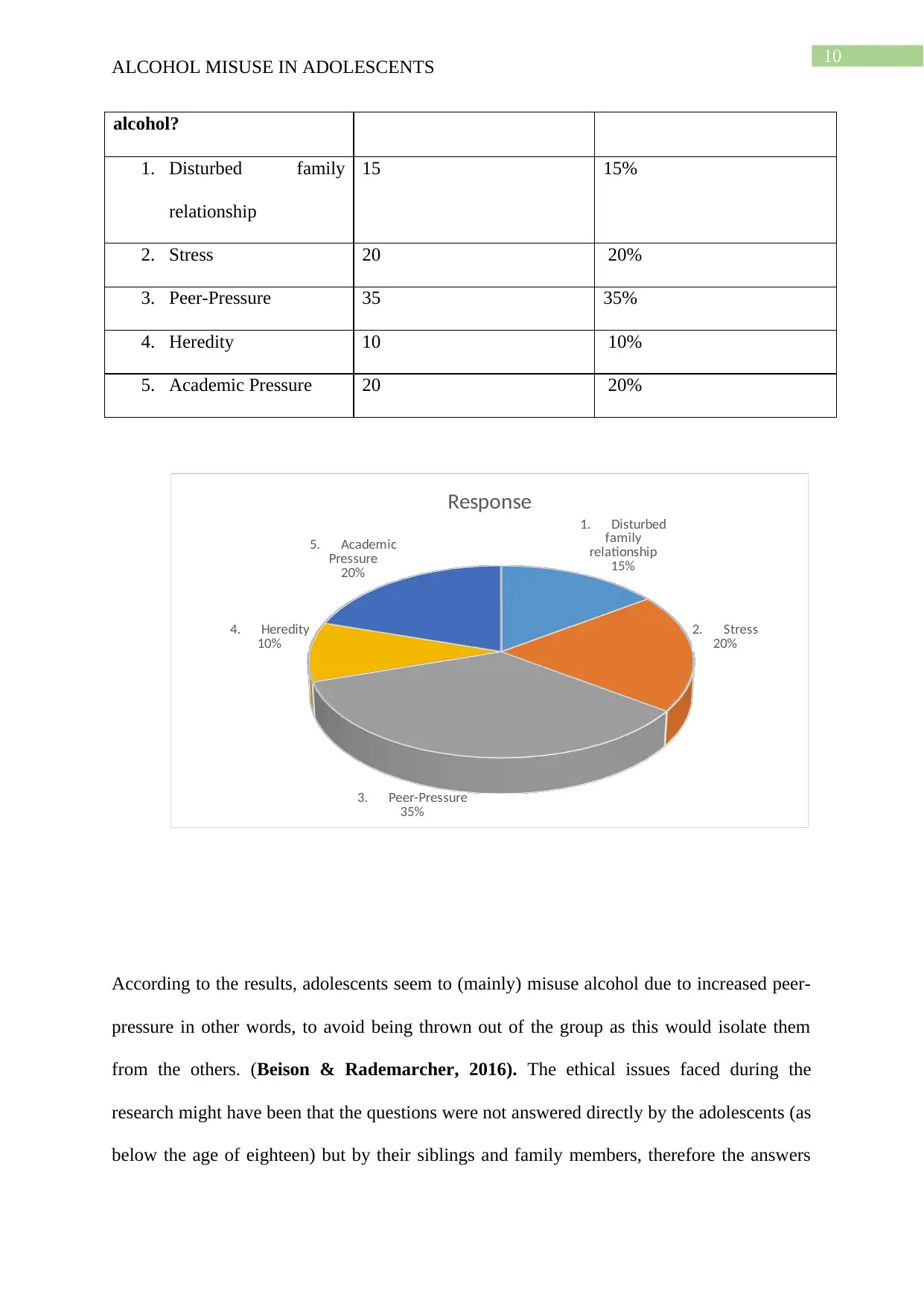
10
ALCOHOL MISUSE IN ADOLESCENTS
alcohol?
1. Disturbed family
relationship
15 15%
2. Stress 20 20%
3. Peer-Pressure 35 35%
4. Heredity 10 10%
5. Academic Pressure 20 20%
1. Disturbed
family
relationship
15%
2. Stress
20%
3. Peer-Pressure
35%
4. Heredity
10%
5. Academic
Pressure
20%
Response
According to the results, adolescents seem to (mainly) misuse alcohol due to increased peer-
pressure in other words, to avoid being thrown out of the group as this would isolate them
from the others. (Beison & Rademarcher, 2016). The ethical issues faced during the
research might have been that the questions were not answered directly by the adolescents (as
below the age of eighteen) but by their siblings and family members, therefore the answers
ALCOHOL MISUSE IN ADOLESCENTS
alcohol?
1. Disturbed family
relationship
15 15%
2. Stress 20 20%
3. Peer-Pressure 35 35%
4. Heredity 10 10%
5. Academic Pressure 20 20%
1. Disturbed
family
relationship
15%
2. Stress
20%
3. Peer-Pressure
35%
4. Heredity
10%
5. Academic
Pressure
20%
Response
According to the results, adolescents seem to (mainly) misuse alcohol due to increased peer-
pressure in other words, to avoid being thrown out of the group as this would isolate them
from the others. (Beison & Rademarcher, 2016). The ethical issues faced during the
research might have been that the questions were not answered directly by the adolescents (as
below the age of eighteen) but by their siblings and family members, therefore the answers
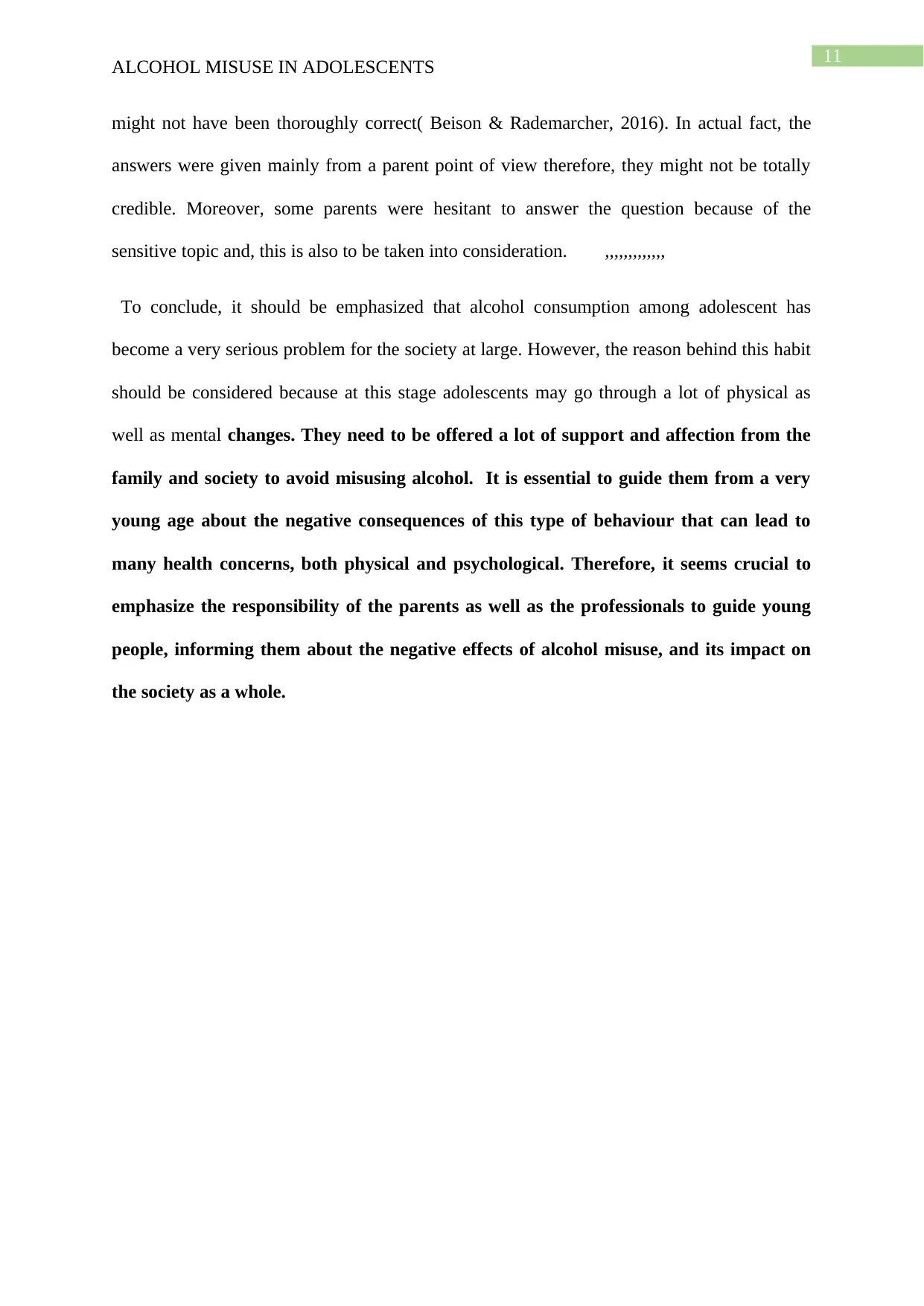
11
ALCOHOL MISUSE IN ADOLESCENTS
might not have been thoroughly correct( Beison & Rademarcher, 2016). In actual fact, the
answers were given mainly from a parent point of view therefore, they might not be totally
credible. Moreover, some parents were hesitant to answer the question because of the
sensitive topic and, this is also to be taken into consideration. ,,,,,,,,,,,,,
To conclude, it should be emphasized that alcohol consumption among adolescent has
become a very serious problem for the society at large. However, the reason behind this habit
should be considered because at this stage adolescents may go through a lot of physical as
well as mental changes. They need to be offered a lot of support and affection from the
family and society to avoid misusing alcohol. It is essential to guide them from a very
young age about the negative consequences of this type of behaviour that can lead to
many health concerns, both physical and psychological. Therefore, it seems crucial to
emphasize the responsibility of the parents as well as the professionals to guide young
people, informing them about the negative effects of alcohol misuse, and its impact on
the society as a whole.
ALCOHOL MISUSE IN ADOLESCENTS
might not have been thoroughly correct( Beison & Rademarcher, 2016). In actual fact, the
answers were given mainly from a parent point of view therefore, they might not be totally
credible. Moreover, some parents were hesitant to answer the question because of the
sensitive topic and, this is also to be taken into consideration. ,,,,,,,,,,,,,
To conclude, it should be emphasized that alcohol consumption among adolescent has
become a very serious problem for the society at large. However, the reason behind this habit
should be considered because at this stage adolescents may go through a lot of physical as
well as mental changes. They need to be offered a lot of support and affection from the
family and society to avoid misusing alcohol. It is essential to guide them from a very
young age about the negative consequences of this type of behaviour that can lead to
many health concerns, both physical and psychological. Therefore, it seems crucial to
emphasize the responsibility of the parents as well as the professionals to guide young
people, informing them about the negative effects of alcohol misuse, and its impact on
the society as a whole.
⊘ This is a preview!⊘
Do you want full access?
Subscribe today to unlock all pages.

Trusted by 1+ million students worldwide
1 out of 16
Related Documents
Your All-in-One AI-Powered Toolkit for Academic Success.
+13062052269
info@desklib.com
Available 24*7 on WhatsApp / Email
![[object Object]](/_next/static/media/star-bottom.7253800d.svg)
Unlock your academic potential
Copyright © 2020–2026 A2Z Services. All Rights Reserved. Developed and managed by ZUCOL.





